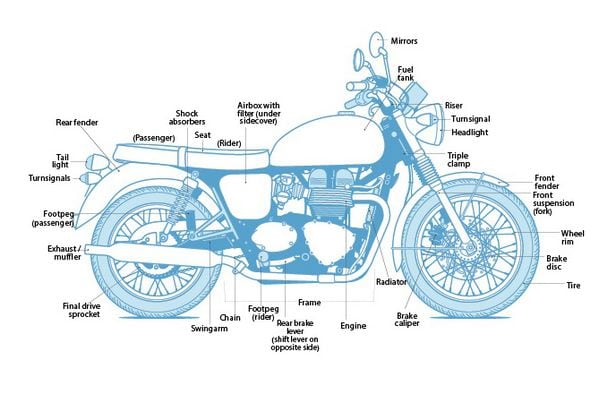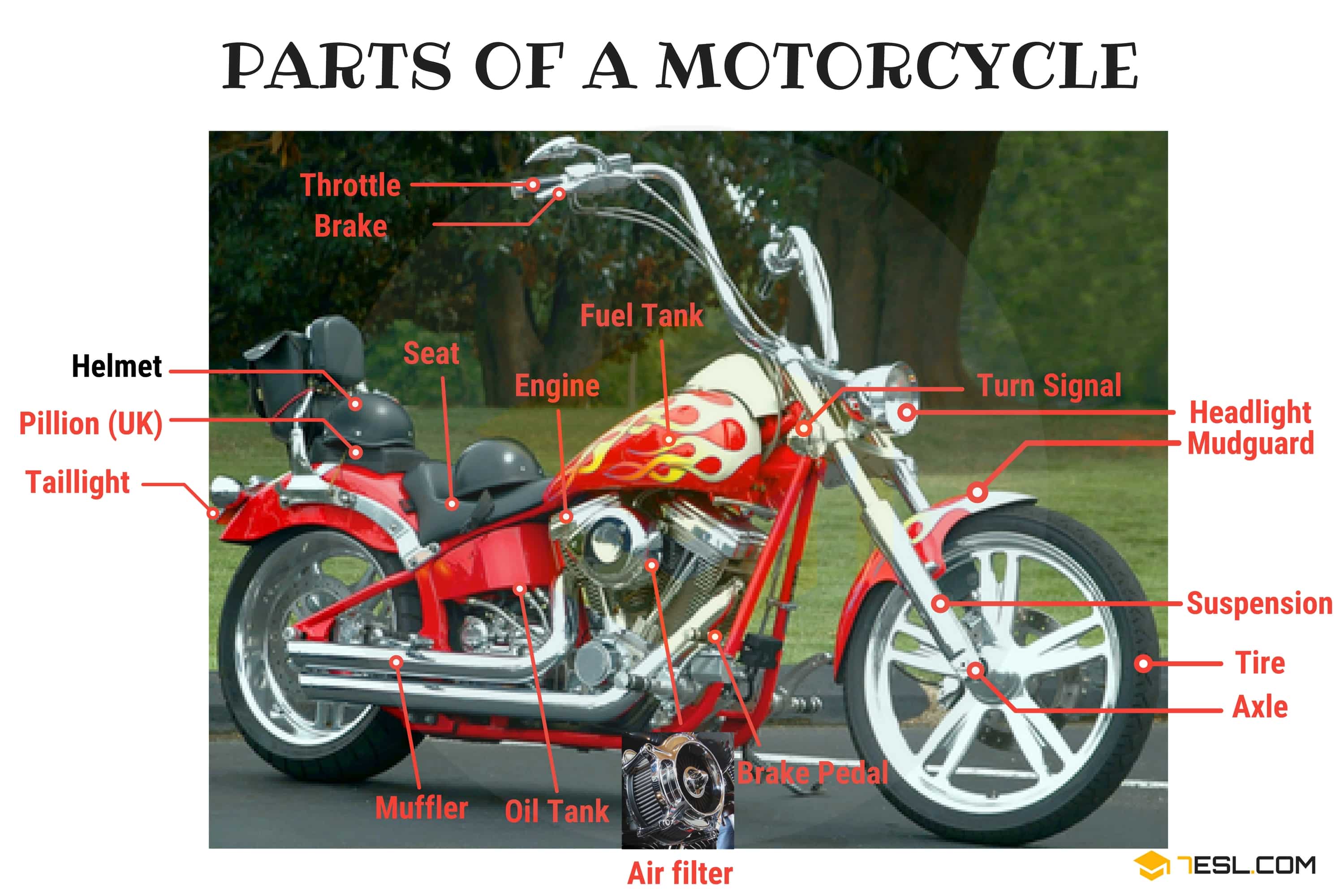How-To Guide for Installing New Motorbike Components NZ on Older Bikes
How-To Guide for Installing New Motorbike Components NZ on Older Bikes
Blog Article
Discover the Necessary MotorBike Parts You Required for Optimum Efficiency
Understanding the important parts of a bike is essential for accomplishing peak efficiency. Each part, from the engine to the stopping system, plays a vital role in total functionality and safety. Normal upkeep can prevent unforeseen failures and enhance the riding experience. Nevertheless, many cyclists forget the details of these systems. Uncovering how they interact can result in a more reliable experience. What critical parts should every rider prioritize?
The Engine: The Heart of Your Bike
The engine acts as the core element of a motorcycle, driving its performance and specifying its capacities. It is accountable for transforming gas right into mechanical energy, which powers the bike forward. Various kinds of engines are employed, including single-cylinder, V-twin, and inline arrangements, each offering distinct attributes fit for various riding functions and designs. The engine size, normally measured in cubic centimeters (cc), considerably affects performance, with bigger engines generally supplying even more power and torque.Furthermore, the engine's style and technology, such as fuel injection systems or air-cooling versus liquid-cooling, influence effectiveness and dependability. Maintenance is important for peak procedure; aspects like normal oil adjustments and monitoring ignition system guarantee long life. Bikers typically consider an engine's responsiveness and level of smoothness, as these attributes boost the general riding experience. Eventually, the engine stays a crucial aspect that specifies not just the bike's efficiency but likewise the rider's link to the machine.
The Transmission: Changing Gears Smoothly
The transmission plays an important function in a motorcycle's performance, particularly in the mechanics of equipment changing. Recognizing just how to move equipments smoothly can improve the general riding experience, while normal upkeep warranties peak functionality. Appropriate attention to these facets can substantially affect the long life and performance of the motorcycle.

Gear Shifting Mechanics
Smooth equipment changing is essential for optimal motorbike efficiency, significantly influencing both velocity and control. The auto mechanics of equipment shifting include the interaction in between the clutch, equipment bar, and transmission system. When a motorcyclist engages the clutch, it disengages the engine from the transmission, enabling an equipment modification without damaging the parts. A well-timed release of the clutch, combined with specific activity of the gear lever, assists in a smooth change between gears. This procedure assures that the engine operates within its best power band, boosting performance. Motorcycle Spares Christchurch. Furthermore, comprehending the gear proportions and their effect on speed and torque can assist cyclists make notified selections during changes, eventually adding to a more pleasurable and receptive riding experience
Upkeep Tips Relevance
Regular upkeep plays a crucial duty in assuring that the transmission system operates effectively, permitting smooth equipment changes. Routinely inspecting and transforming the transmission liquid is essential, as old fluid can cause enhanced friction and wear. Furthermore, evaluating the clutch for wear assurances peak engagement and disengagement, stopping slippage throughout gear adjustments. Lubrication of moving components is just as important to lower friction and enhance performance. Motorbike proprietors need to also keep an eye on for leaks and uncommon sounds, as these can suggest underlying problems. By adhering to these maintenance ideas, bikers can lengthen the lifespan of their transmission system, guaranteeing that gear changes stay seamless and contributing to the overall performance of their motorcycle.
The Braking System: Ensuring Safety And Security on Every Trip
Braking systems are fundamental elements that straight influence a motorbike's security and efficiency. They include numerous parts, including brake pads, rotors, calipers, and hydraulic lines, all working together to guarantee efficient slowdown. The type of stopping system-- usually either disc or drum-- affects responsiveness and stopping power.Regular upkeep is necessary to support peak efficiency; worn brake pads can lead to lowered efficiency and boosted quiting ranges. In addition, the quality of brake fluid must be checked, as it can take in dampness with time, jeopardizing stopping efficiency.Riders need to likewise think about the value of anti-lock stopping systems (ABDOMINAL), which prevent wheel lockup during abrupt stops, enhancing overall security. Effectively operating brakes are not nearly quiting; they instill confidence in the rider, allowing for safer navigating through various terrains. Inevitably, a trustworthy braking system is important for appreciating every adventure with satisfaction.
The Suspension: Enhancing Comfort and Control
A well-functioning suspension system substantially adds to a motorcycle's overall performance, enhancing the effectiveness of the braking system. The suspension plays a substantial duty in soaking up shocks from unequal surface areas, guaranteeing a smoother trip while keeping tire call with the roadway. This get in touch with is important for both stability and control, permitting cyclists to browse edges with confidence and precision.Different kinds of suspension systems, such as telescopic forks or mono-shocks, use varying degrees of convenience Full Report and handling. Appropriately tuned suspension improves responsiveness, giving the biker with a more connected feeling to the motorbike. Regular maintenance checks are very important to determine the suspension parts, including dampers and springtimes, are functioning at their ideal. A reliable suspension system not only elevates the riding experience but likewise contributes to the long life of various other motorcycle parts by reducing wear and tear. As a result, purchasing high quality suspension is important for any type of major motorcycle fanatic.
The Tires: Attaching You to the Road
Tires play an essential duty in a motorcycle's performance, working as the main link between the biker and the roadway. Comprehending the different kinds of tires available can substantially impact handling and safety and security. In addition, regular upkeep is vital to guarantee peak tire efficiency and long life.
Tire Keys In Explained
How do various tire kinds affect a motorcycle's performance? Tire kinds play a crucial role in establishing a motorcycle's security, handling, and grip. Sport tires, made for high efficiency, deal improved traction and responsiveness on smooth roadways, making them perfect for competing and aggressive riding. Conversely, visiting tires prioritize durability and comfort, offering a smoother trip for long-distance traveling. Off-road tires, defined by their rugged walk patterns, master grip on unpaved surfaces, appropriate for journey fanatics. Additionally, dual-sport tires blend qualities from both on-road and off-road categories, accommodating flexible riding needs. Ultimately, choosing the ideal tire type is important for enhancing performance, ensuring safety, and improving the general riding experience.
Upkeep Tips Offered
While riding when driving, keeping suitable tire condition is vital for safety and security and efficiency. On a regular basis inspecting tire pressure is very important, as under-inflated tires can lead to bad handling and boosted wear. It is suggested to inspect tread deepness regularly; worn tires concession hold and security. Additionally, motorcyclists ought to look for signs of damages, such as cracks or bulges, which can show the demand for replacement. Turning tires regularly ensures even put on, improving longevity. Maintaining tires tidy from debris and preventing extreme visuals can prolong their lifespan. Maintaining appropriate placement and balance adds to peak efficiency, lessening anxiety on other bike parts. Abiding by these upkeep tips will considerably boost the total riding experience.
The Fuel System: Sustaining Performance and Effectiveness
The fuel system plays an essential duty in taking full advantage of a motorcycle's performance and effectiveness, as it assures the optimal shipment of gas to the engine. It makes up a number of important elements, consisting of the fuel container, gas pump, fuel filter, and fuel injectors or carburetor. Each component has to work effectively to guarantee a smooth and powerful ride.The gas storage tank stores gasoline and supplies it to the engine using the gas pump, which produces the necessary pressure. A fuel filter prevents contaminants from entering the engine, while the injectors or carburetor mix fuel with air for combustion.Proper upkeep of the gas system is important; a clogged filter or malfunctioning injector can cause decreased performance and enhanced gas consumption. By validating that the fuel system operates successfully, riders can enjoy enhanced throttle response, much better fuel economic situation, and on the whole improved riding experience.
The Electrical System: Powering Your Trip
A reliable electrical system is important for the overall capability and security of a motorbike, as it powers important parts such as the ignition, lights, and different electronic systems. This system consists of the battery, which stores power, and the generator, liable for creating power while the engine runs. The electrical wiring harness attaches these parts, making certain dependable power distribution.Additionally, integrates secure the system from overloads, while relays help regulate high-current devices with low-power signals. A properly maintained electrical system improves efficiency by making sure smooth starts and constant operation of lights and signals, important for biker visibility and safety.Regular checks of the battery's cost and connections are necessary for protecting against electrical failures. Bikers ought to additionally inspect circuitry for damage, ensuring all elements function ideally. Ultimately, a robust electrical system contributes considerably to the general efficiency and reliability of the motorcycle.
Often Asked Inquiries
How Typically Should I Change My Motorcycle's Battery?
The frequency of motorcycle battery replacement relies on usage and upkeep (Bike Parts Wellington). Generally, batteries must be changed every 3 to five years. Routine checks can help identify when a substitute is essential for peak performance
What Devices Do I Need for Fundamental Motorbike Upkeep?
For fundamental motorcycle upkeep, one needs crucial tools such as an outlet set, wrenches, screwdrivers, pliers, tire stress gauge, and a torque wrench. These tools assist in efficient upkeep and ensure the motorbike runs efficiently and securely.
Exactly How Can I Boost My Motorcycle's Aerodynamics?
To improve motorbike aerodynamics, one must take into consideration readjusting fairings, using windshield extensions, maximizing body placement, and minimizing overall weight. These modifications assist reduce drag, boosting security and gas performance during adventures.
What Are the Signs of a Failing Electric System?
Signs of a stopping working electrical system consist of dimming lights, problem starting, irregular instrument readings, and blown integrates. Bike Parts Wellington. Unusual smells or deterioration around battery terminals may additionally show underlying problems requiring immediate interest for security and efficiency

Just how Do I Choose the Right Oil for My Bike?
When selecting oil for a motorbike, one must take into consideration internet the maker's specs, viscosity ratings, and the kind of riding. In addition, standard versus synthetic oil can affect efficiency and engine security, influencing the choice considerably. The engine dimension, generally determined in cubic centimeters (cc), considerably affects performance, with larger engines see generally supplying more power and torque.Furthermore, the engine's layout and technology, such as fuel injection systems or air-cooling versus liquid-cooling, affect performance and reliability. A well-functioning suspension system significantly adds to a motorcycle's total efficiency, matching the efficiency of the braking system. The gas system plays an essential duty in making the most of a motorbike's efficiency and performance, as it guarantees the ideal delivery of fuel to the engine. A gas filter protects against contaminants from getting in the engine, while the injectors or carburetor mix fuel with air for combustion.Proper maintenance of the fuel system is essential; a stopped up filter or malfunctioning injector can lead to decreased efficiency and boosted gas intake. A properly maintained electrical system boosts efficiency by making sure smooth starts and constant procedure of signals and lights, vital for rider presence and safety.Regular checks of the battery's fee and connections are essential for protecting against electrical failings.
Report this page